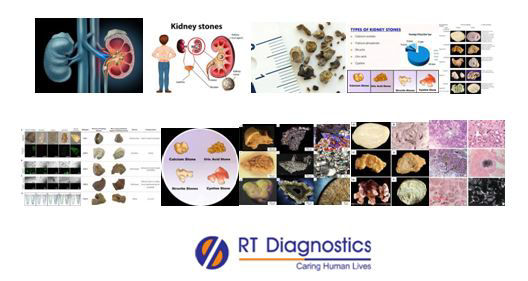Kidney Stone Analysis:
Why Kidney Stone Analysis Test?
CLINICAL INFORMATION
Renal stones are also called kidney stones, renal calculi, urinary calculi, nephrolithiasis, urolithiasis etc. The formation of calculus (plural calculi) is known as lithiasis. Calculi is a concentrated aggregate of material (usually mineral salts), that forms deposits in any organ or duct of the body. Kidney stones (lithiasis or calculi) are physical aggregates of solid minerals formed from the supersaturation of urine (substances in the urine). Calculi in the urinary system are called urinary calculi (including kidney stones or nephroliths), bladder stones are called vesical calculi or cystoliths, stones in the GIT are called enteroliths, calculi of the gall bladder are called cholelithiasis, calculi in the nasal passage is rhinoliths, calculi in naval are called omphaloliths. Stones can also occur in the salivary gland (sialoliths), tonsils (tonsilloliths), veins (phleboliths) etc. Many medical conditions can result in lithiasis. Etiology of lithiasis includes underlying abnormal excess of minerals such as hypercalcemia and/or consuming calcium oxalate-rich diets, lifestyle or dietary factors (frequent intake of excessive animal fats in diet) for gall stones, slow fluid flow rates and local bacterial action (kidney stones). Renal calculi can cause complications such as hydronephrosis, pyelonephritis, urolithiasis (urinary bladder stone) and can cause urinary bladder outlet obstruction. Gall stones (cholelithiasis can cause complications such as cholecystitis (gall bladder infection), cholangitis (biliary tree infection), choledocholithiasis (gall stones in the bile duct), gall stone pancreatitis (gallstones obstructing the pancreatic duct causing inflammation to the pancreas). Types of kidney stones include calcium stones, uric-acid stones, cysteine stones, struvite stones etc. Clinical manifestations include severe sharp pain in the side and back below the ribs, pain radiates to the lower abdomen and groin, nausea, vomiting, fever and chills (in case of infection like UTI etc) burning micturition, pain occurs as a wave pattern that fluctuates in intensity, hematuria (pink, red-brown urine), cloudy or foul-smelling urine, hydro-nephrosis, pyelonephritis, difficulty passing urine etc. High-risk factors for developing stones include family or personal history (family history of stones, past episodes of any previous histories of stones), obesity, dehydration (chronic diarrhoea), certain diets or lifestyle factors (high protein, salt-rich diet, high sugar diet can increase the incidence of certain kidney stones), GIT diseases (IBD), surgeries (gastric bypass), any medical abnormal conditions (renal tubular necrosis, cystinuria, hyperoxaluria, hereditary xanthinuria, hyperparathyroidism, repeated UTI – recurrence), medications (calcium based antacids, medications to treat migraine and antidepressants etc), supplements (vitamin C or ascorbic acid increases the risk of renal stone in patients with pre-existing conditions) etc. Kidney stone analysis is a crucial laboratory diagnostic procedure done for an accurate exploration performed for investigation of the composition of renal calculi for elucidation. Hence renal calculi sample specimen may be required for the analysis of its composition. It can either be filtered out from urine if passed out with medications or a biopsy specimen of lithiasis (calculi) may be required for analysis. This test result helps in preventing recurrence (by avoiding certain dietary habits and for prognosis (medication opted for such renal calculi types). Additional tests include clinical history, physical examination, laboratory diagnostic tests for calcium oxalate in blood and/or urine specimens, 24 hours urine test for urinary stone analysis, and urinalysis for casts and crystals (microscopic examination). Other tests include electrolyte panel tests, X-ray, CT Scan, Ultrasound etc.

General Instructions:
Sample Requirement: Specimen – Urine Sample. Test Preparation: None.
NOTE - Sample for specimen collections may vary based on the patient’s condition/cases according to the patient’s presenting complaints/signs or symptoms:
SPECIMEN REQUIREMENT (Special or Rare Cases) - As instructed and guided by Physician / Clinician / Pathologist / as per Laboratory’s requirements, according to procedures and protocols.
This Multi-Specialty Clinical Referral Laboratory RT DIAGNOSTICS provides precise and accurate tests with an extensive range of testing services to the medical centres to help in the diagnosis and identification of pathology in the test specimens for infectious diseases and also to evaluate the function of organ systems of the patient. It prevents further complications and helps to stabilize and restore health to near normalcy at the earliest without delay



